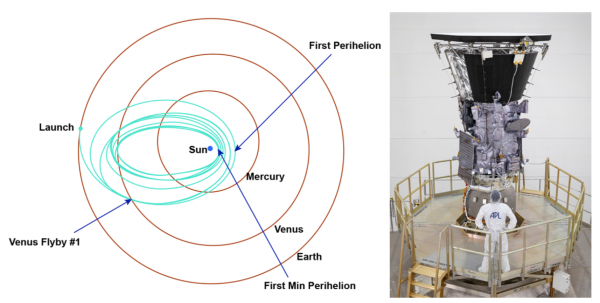“2019年BAAO第1题-帕克太阳探测器”的版本间的差异
(→英文题目) |
(→英文题目) |
||
| 第5行: | 第5行: | ||
[[文件:BAAO2019 fig1.png|替代= Figure 1: Left: The journey PSP will take to get from the Earth to the final orbit around the Sun. Right: The probe just after assembly in the John Hopkins University Applied Physics Laboratory. Credit: NASA / John Hopkins APL / Ed Whitman.|左|无框|600x600像素|'''Figure 1''': ''Left'': The journey PSP will take to get from the Earth to the final orbit around the Sun. ''Right'': The probe just after assembly in the John Hopkins University Applied Physics Laboratory. Credit: NASA / John Hopkins APL / Ed Whitman. ]] | [[文件:BAAO2019 fig1.png|替代= Figure 1: Left: The journey PSP will take to get from the Earth to the final orbit around the Sun. Right: The probe just after assembly in the John Hopkins University Applied Physics Laboratory. Credit: NASA / John Hopkins APL / Ed Whitman.|左|无框|600x600像素|'''Figure 1''': ''Left'': The journey PSP will take to get from the Earth to the final orbit around the Sun. ''Right'': The probe just after assembly in the John Hopkins University Applied Physics Laboratory. Credit: NASA / John Hopkins APL / Ed Whitman. ]] | ||
| − | |||
| − | |||
==英文解答== | ==英文解答== | ||
2019年10月5日 (六) 23:30的版本
英文题目
Qu 1. Parker Solar Probe
The Parker Solar Probe (PSP) is part of a mission to learn more about the Sun, named after the scientist that first proposed the existence of the solar wind, and was launched on 12th August 2018. Over the course of the 7 year mission it will orbit the Sun 24 times, and through 7 flybys of Venus it will lose some energy in order to get into an ever tighter orbit (see Figure 1). In its final 3 orbits it will have a perihelion (closest approach to the Sun) of only $$r_{peri} = 9.86 R_{⊙}$$, about 7 times closer than any previous probe, the first of which is due on 24th December 2024. In this extreme environment the probe will not only face extreme brightness and temperatures but also will break the record for the fastest ever spacecraft.
